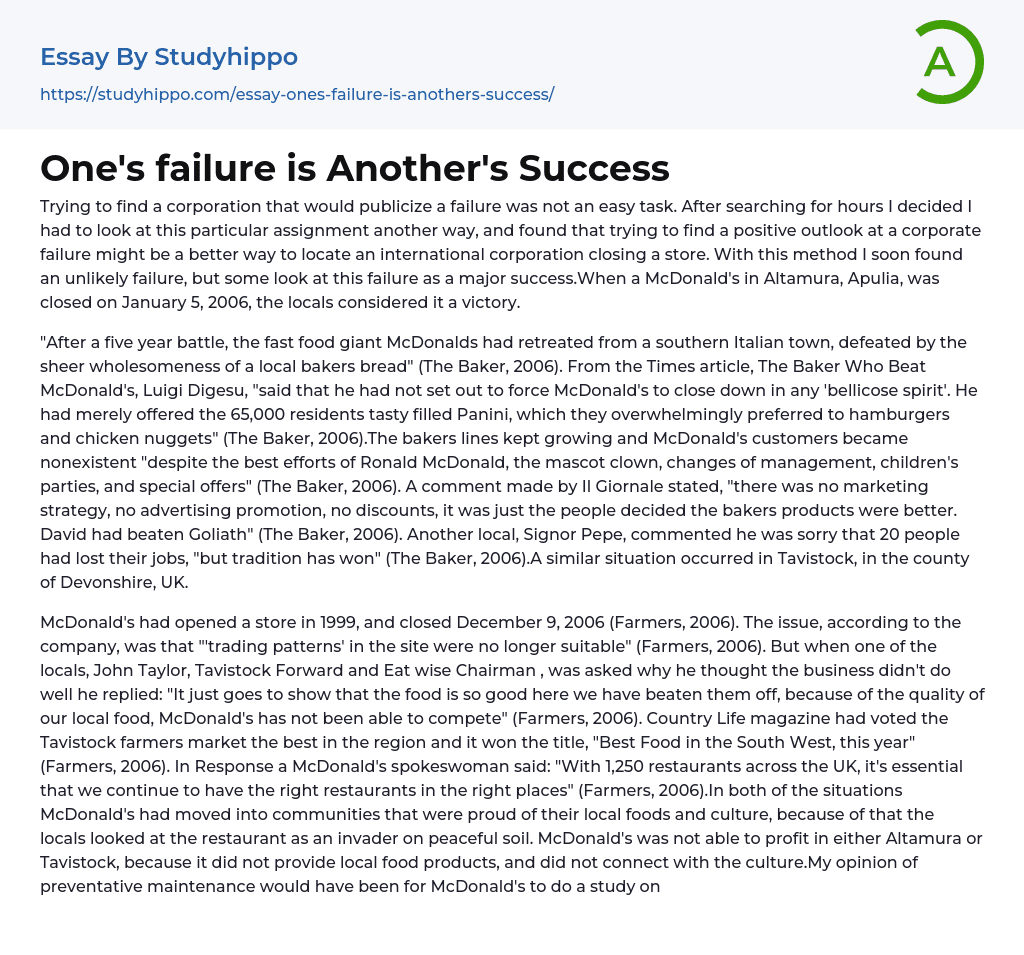Finding a corporation that would willingly publicize a failure proved to be a challenging endeavor. After hours of searching, I realized that approaching this assignment from a different perspective might be more fruitful. Instead of seeking out information about a corporation closing a store, I decided to focus on identifying instances where a positive outlook could be found in a corporate failure. It was through this method that I stumbled upon an unlikely failure, which some view as a significant success. On January 5, 2006, a McDonald's in Altamura, Apulia closed its doors, and the locals celebrated it as a victory.
"Despite a five-year struggle, the fast food giant McDonald's was forced to withdraw from a town in southern Italy, defeated by the superior quality of bread from a local bakery" (The Baker, 2006). According to Luigi Digesu, featured in The Times article tit
...led The Baker Who Beat McDonald's, his goal was never to aggressively shut down McDonald's. Instead, he simply offered the 65,000 residents delicious filled Panini sandwiches, which they overwhelmingly preferred to hamburgers and chicken nuggets (The Baker, 2006). The bakery's customer base flourished while McDonald's customers dwindled, despite efforts from mascot clown Ronald McDonald, management changes, children's parties, and special offers (The Baker, 2006). In a comment made by Il Giornale, it was stated that there was no fancy marketing strategy or advertising promotion involved; it was solely the people's decision that the bakery's products were superior. The triumph of David over Goliath had occurred (The Baker, 2006). Signor Pepe expressed regret that 20 individuals lost their jobs but acknowledged that tradition had prevailed (The Baker, 2006). A similar situation unfolded in
Tavistock in Devonshire County, UK.
McDonald's opened a store in 1999 but closed on December 9, 2006 due to unsuitable trading patterns. However, locals believed that the closure was due to the superior quality of their local food beating off McDonald's competition. The Tavistock farmers market was recognized as the best in the region, further emphasizing the prominence of local food. McDonald's spokeswoman acknowledged the importance of having suitable restaurants in the right places. Both Altamura and Tavistock communities viewed McDonald's as an invader on their peaceful soil due to their pride in local food and culture. McDonald's failed to profit in both locations as they did not provide local food products or connect with the culture. In my opinion, McDonald's should have conducted a study on the community's culture before establishing the restaurant instead of attempting to adapt afterwards.
After familiarizing oneself with the culture and individuals of the town, it is advisable to provide them with a basic blueprint. If the majority of the community does not desire the presence of the business in town, McDonald's should refrain from establishing itself there. It is wrong to impose a product upon people who originally had no interest in the business. The situation faced by McDonald's in these two towns closely resembles that of Wal-Mart in Germany. The executives at Wal-Mart did not conduct research on product sales or European workplace ethics. As stated by Shaefer (p.68), "German shoppers, who were accustomed to efficient and impersonal service, were put off by the friendly and outgoing manner exhibited by Wal-Mart employees." Additionally, German employees, who had grown up in a culture that accepted on-the-job romances, found the company's
policy against such relationships to be peculiar.
Wal-Mart has learned the valuable lesson of not imposing its corporate culture on foreign customers and employees, which McDonald's should also take heed of. McDonald's should focus on buying and using local products as much as possible and even consider incorporating local dishes into their menu. By following these steps, McDonald's may have avoided being forced out. Learning from mistakes is crucial for success, as demonstrated by the experiences of McDonald's in Altamura and Tavistock. These failures provided valuable lessons for the company on how to approach foreign cities and towns when opening new stores. In India, McDonald's was able to turn their failure into a thriving success. They faced challenges in adapting their menu to a country where cows are considered sacred, but eventually found a successful strategy.
McDonald's made several changes to their menu, including replacing the Big Mac with a mutton burger, adding chicken kabobs and veggie-burgers. Additionally, they established a "50-50 joint venture with two well-connected Indian entrepreneurs" (Mucha & Scheffler, 2007). As a result, McDonald's experienced success in India with certain stores reporting a 40% increase in sales compared to the previous year (Mucha ; Scheffler, 2007).
- Fast Food Restaurant essays
- Accident essays
- Awareness essays
- Benefits of Volunteering essays
- Challenges essays
- Childhood Memories essays
- Decision essays
- Driving essays
- Event essays
- Excellence essays
- Expectations essays
- Failure essays
- Farewell essays
- Flight essays
- Gift essays
- Growing Up essays
- Ignorance essays
- Improve essays
- Incident essays
- Knowledge essays
- Luck essays
- Memories essays
- Mistake essays
- Obstacles essays
- Overcoming Challenges essays
- Party essays
- Peace Corps essays
- Personal Experience essays
- Problems essays
- Sacrifices essays
- Struggle essays
- Success essays
- Trust essays
- Vacation essays
- Visit essays
- Volunteering essays
- Adidas essays
- Amazon essays
- Apple essays
- Bmw essays
- British Airways essays
- Burger King essays
- Coca-Cola essays
- Company essays
- Costco essays
- Dell essays
- Ebay essays
- Enron essays
- Facebook essays
- Ford Motor Company essays




